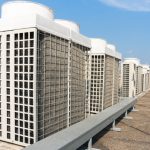 Commercial HVAC (Heating, Ventilation, and Air Conditioning) systems play a crucial role in maintaining a comfortable and productive environment for businesses. However, these systems can also consume a significant amount of energy, resulting in high electricity bills and environmental impact. Fortunately, there are several ways to optimize the electrical efficiency of commercial HVAC systems. In this blog post, we will explore some useful tips that can help businesses reduce energy consumption and lower costs while still maintaining a comfortable indoor environment.
Commercial HVAC (Heating, Ventilation, and Air Conditioning) systems play a crucial role in maintaining a comfortable and productive environment for businesses. However, these systems can also consume a significant amount of energy, resulting in high electricity bills and environmental impact. Fortunately, there are several ways to optimize the electrical efficiency of commercial HVAC systems. In this blog post, we will explore some useful tips that can help businesses reduce energy consumption and lower costs while still maintaining a comfortable indoor environment.
1. Regular Maintenance and Cleaning
First and foremost, regular maintenance and cleaning of commercial HVAC systems is essential for optimal performance and energy efficiency. Dust, dirt, and debris can accumulate on filters, coils, and other components, obstructing airflow and making the system work harder to maintain the desired temperature. By scheduling routine maintenance and cleaning with professional HVAC contractors, businesses can ensure that their HVAC systems are operating at peak efficiency, reducing energy consumption and extending the system’s lifespan.
2. Upgrading to Energy-Efficient Equipment
If your commercial HVAC system is outdated, investing in energy-efficient equipment can have a significant impact on electrical efficiency. Consider replacing old HVAC units with newer models that have earned the ENERGY STAR label. ENERGY STAR-rated equipment is designed to meet strict energy efficiency guidelines, resulting in more efficient operation and lower energy costs. Additionally, newer systems often have advanced features that allow for better control and optimization of energy usage.
3. Programmable Thermostats and HVAC Controls
Implementing programmable thermostats and advanced HVAC controls can help businesses optimize energy usage based on occupancy patterns and desired comfort levels. With programmable thermostats, businesses can set temperature schedules that lower heating or cooling when the building is unoccupied and adjust to more comfortable temperatures before employees arrive. HVAC controls, such as zoning systems, allow different areas of the building to be regulated separately, preventing excessive heating or cooling in areas that are not in use.
4. Proper Insulation and Sealing
Ensuring that your commercial building is properly insulated and sealed is crucial for optimizing electrical efficiency in HVAC systems. Poor insulation and air leaks can result in heat gain or loss, forcing the HVAC system to work harder to compensate for the temperature fluctuations. Conduct an energy audit of your building to identify areas that need insulation improvement and seal any gaps or cracks. By creating a well-insulated and properly sealed envelope, you can minimize energy loss and significantly reduce the workload on your HVAC system.
5. Airflow and Ventilation Optimization
Proper airflow and ventilation are essential for maintaining a comfortable indoor environment and optimizing electrical efficiency. Ensure that the supply and return grilles are clean and unobstructed, allowing for free airflow throughout the building. Regularly check and clean ducts, ensuring that they are properly sealed and insulated to prevent air leakage. Additionally, consider implementing demand control ventilation (DCV) systems that adjust ventilation rates based on occupancy levels, avoiding excessive energy waste.
6. Lighting Efficiency
While not directly related to HVAC systems, optimizing lighting efficiency can indirectly contribute to reducing the load on commercial HVAC systems. High-efficiency lighting technologies, such as LED (Light Emitting Diode) lights, consume less energy and generate less heat compared to traditional incandescent bulbs. By upgrading to LED lighting or implementing daylight harvesting techniques that maximize natural lighting, businesses can reduce the amount of heat generated and, in turn, lessen the cooling load on HVAC systems.
7. Regular System Monitoring and Data Analysis
To ensure ongoing optimization of electrical efficiency in commercial HVAC systems, it is crucial to monitor and analyze system performance regularly. Utilize building automation systems (BAS) or energy management software to collect data on energy usage, temperature variations, and equipment operation. By analyzing this data, you can identify any anomalies or inefficiencies and take corrective measures promptly. Regular monitoring and analysis enable continuous improvement and help businesses stay proactive in managing their HVAC systems’ energy consumption.
Summary
Optimizing electrical efficiency in commercial HVAC systems is a worthwhile endeavor for businesses looking to reduce energy costs and minimize their environmental footprint. By following these tips, including regular maintenance and cleaning, upgrading to energy-efficient equipment, implementing programmable thermostats and HVAC controls, ensuring proper insulation and sealing, optimizing airflow and ventilation, focusing on lighting efficiency, and monitoring system performance, businesses can achieve significant energy savings while maintaining a comfortable indoor environment. Embracing these optimization strategies not only benefits the bottom line but also contributes to a more sustainable future for businesses and the planet.
